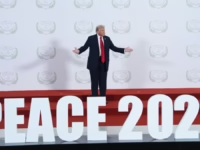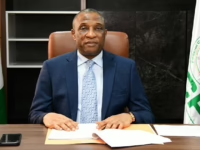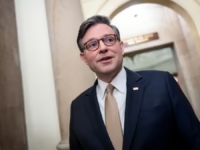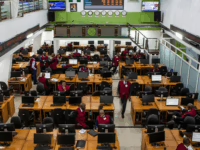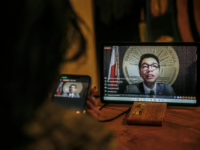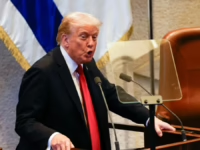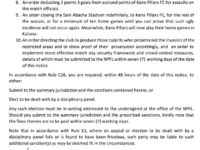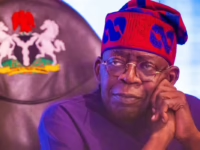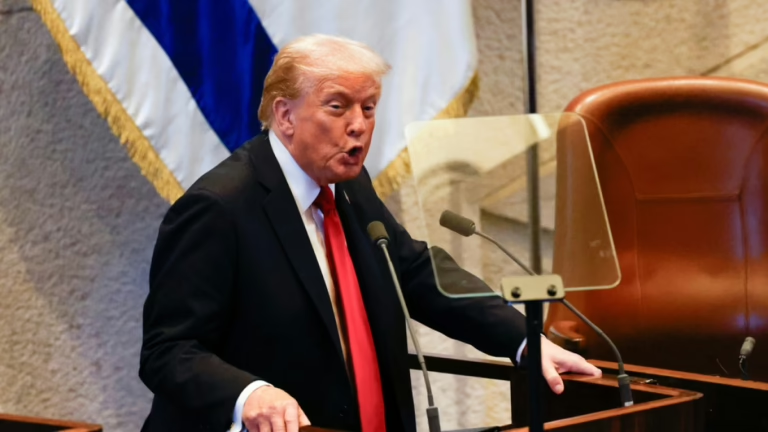During a recent visit to the Middle East, coinciding with the conclusion of Israel’s conflict in Gaza, U.S. President Donald Trump shifted focus to another persistent regional challenge: the strained relations between Washington and Tehran.
Addressing the Israeli Knesset on Monday, Trump, who earlier this year authorized unprecedented airstrikes on Iranian nuclear sites amid a 12-day confrontation between Israel and Iran, extended an offer of reconciliation.
Recommended Stories
list of 3 itemsend of list
“We stand ready whenever Iran is prepared, and it will be the most beneficial decision they have ever made,” Trump declared regarding a potential agreement with Tehran.
“Our hand of cooperation and friendship remains open. I assure you, Iran is interested in striking a deal. It would be a positive development if we could reach an agreement.”
Despite this conciliatory language, the Trump administration continues to adopt a stringent stance toward Iran, with experts noting that significant hurdles remain before any meaningful rapprochement can be achieved.
Trita Parsi, executive vice president of the Quincy Institute for Responsible Statecraft, a Washington-based think tank, observed that the Israeli and U.S. military actions in June-occurring amid ongoing nuclear negotiations-undermined diplomatic efforts with Iran.
“There is a widespread belief that the U.S. is employing diplomacy as a tactic to lull Iran into complacency,” Parsi explained.
‘Iran remains receptive to negotiations’
While Iran has not dismissed the possibility of dialogue, its leadership has been cautious about promptly resuming talks with the U.S.
“Should we receive a fair, balanced, and reasonable proposal from the Americans, we will certainly consider entering negotiations,” Iranian Foreign Minister Abbas Araqchi stated in a recent television interview.
Iran declined an invitation from Egypt to participate in a summit on the Gaza conflict held in Sharm el-Sheikh on Monday, citing ongoing U.S. military actions and sanctions as reasons.
Since the Trump administration’s airstrikes on Iranian nuclear facilities, nuclear negotiations have stalled. The conflict initiated by Israel in June occurred just days before a scheduled round of talks between U.S. and Iranian officials.
The U.S., having withdrawn from the original nuclear agreement in 2018, insists that any new deal must include a complete prohibition on Iran’s uranium enrichment activities.
This demand surpasses the terms of the Joint Comprehensive Plan of Action (JCPOA), which only limited uranium enrichment under strict international oversight.
Iran views this requirement as an infringement on its sovereign rights, emphasizing that the Treaty on the Non-Proliferation of Nuclear Weapons (NPT) does not forbid uranium enrichment.
The disagreement over uranium enrichment remains a major obstacle in negotiations.
“Iran is willing to negotiate,” Parsi told Al Jazeera. “However, despite Trump’s optimistic tone, his expectation is for Iran to surrender. As long as he demands zero enrichment, a deal is unlikely.”
The ongoing conflict between Israel and Iran, which has involved targeted killings of senior military officials and nuclear scientists, as well as airstrikes causing hundreds of casualties, has further deepened doubts about the feasibility of a durable agreement with the U.S.
During Trump’s address to the Knesset, Israeli Prime Minister Benjamin Netanyahu praised the U.S. airstrikes on Iran as a “miraculous event.”
Since the Gaza war began, Israel has launched multiple operations against Iran and its allied groups like Hezbollah throughout the Middle East, significantly weakening their capabilities and reducing U.S. incentives to compromise on uranium enrichment and related issues.
Trump frequently asserts that the U.S. has “obliterated” Iran’s nuclear program through these strikes, though the actual extent of the damage remains uncertain.
The Pentagon estimated earlier this year that Iran’s nuclear efforts have been delayed by one to two years, but Rafael Grossi, director of the International Atomic Energy Agency (IAEA), warned that Iran could resume uranium enrichment within a few months.
Trump’s strategy: Let Iran face pressure
Iran maintains it is not pursuing nuclear weapons, while Israel is widely believed to possess an undeclared nuclear arsenal.
Gregory Brew, an Iran expert at the Eurasia Group, a U.S.-based consultancy, suggested that time favors Trump in the standoff with Iran.
“Trump can express hope for diplomacy, but he also has the luxury to wait and let Iran feel the pressure,” Brew told Al Jazeera via email.
“With its nuclear infrastructure damaged and the likelihood of further Israeli strikes if Iran attempts to rebuild, Supreme Leader Ali Khamenei and his administration face limited options.”
Iran is also contending with renewed United Nations sanctions after Germany, the United Kingdom, and France invoked a snapback mechanism, accusing Iran of violating the JCPOA.
Tehran counters that the U.S. unilaterally exited the agreement in 2018 and considers any new deal involving IAEA inspections “irrelevant” following the U.S. and Israeli attacks.
Iran expressed strong dissatisfaction with the IAEA for not condemning the strikes on its nuclear sites, which Tehran argues are protected under international law.
“There is little incentive for Trump to resume talks without Iranian concessions, and minimal risk in maintaining pressure, as Iran’s capacity to threaten Israel or U.S. interests in the region is currently limited,” Brew noted.
“Trump may prefer to wait several months to see if increased economic hardship compels Iran to return to negotiations on terms favorable to the U.S.”





